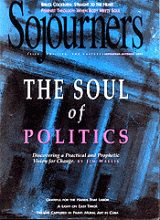(From the introduction.)
The world isn’t working. Things are unraveling, and most of us know it.
Tonight, the urban children of the world’s only remaining superpower will go to bed to the sound of gunfire. Bonds of family and community are fraying. Our most basic virtues of civility, responsibility, justice, and integrity seem to be collapsing. We appear to be losing the ethics derived from personal commitment, social purpose, and spiritual meaning. The triumph of materialism is hardly questioned now, in any part of our society. Both domestically and globally, we are divided along the lines of race, ethnicity, class, gender, religion, culture, and tribe, and environmental degradation and resource scarcity threaten to explode our divisions into a world of perpetual conflict. As I write, the mayor of my own city has requested authority to call out the National Guard in the face of escalating violence in Washington, D.C.
Our intuition tells us the depth of the crisis we face demands more than politics as usual. An illness of the spirit has spread across the land, and our greatest need is for what our religious traditions call "the healing of the nations." The fundamental character of the social, economic, and cultural renewal we urgently need will require a change of both our hearts and our minds. But that change will demand a new kind of politics—a politics with spiritual values.
Several decades ago, Mohandas K. Gandhi warned against what he called the seven social sins. He named them as politics without principle, wealth without work, commerce without morality, pleasure without conscience, education without character, science without humanity, and worship without sacrifice. These social sins today provide an apt description of our leading institutions and cultural patterns; they are the accepted practices of the life of the nation.
Read the Full Article

